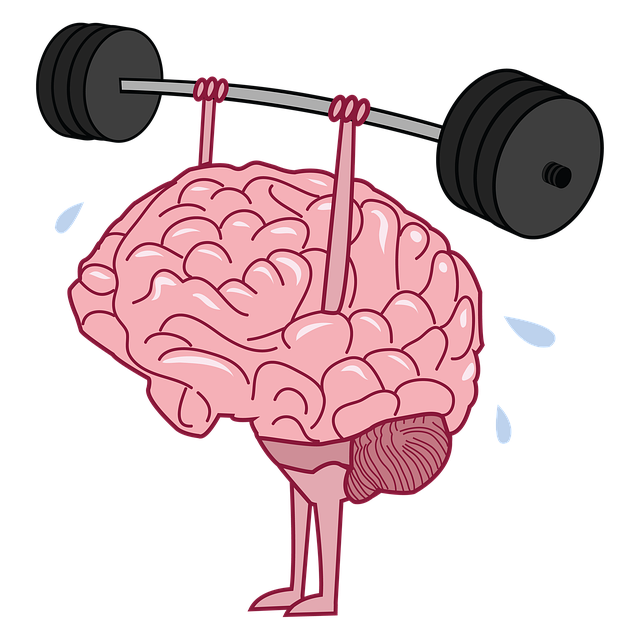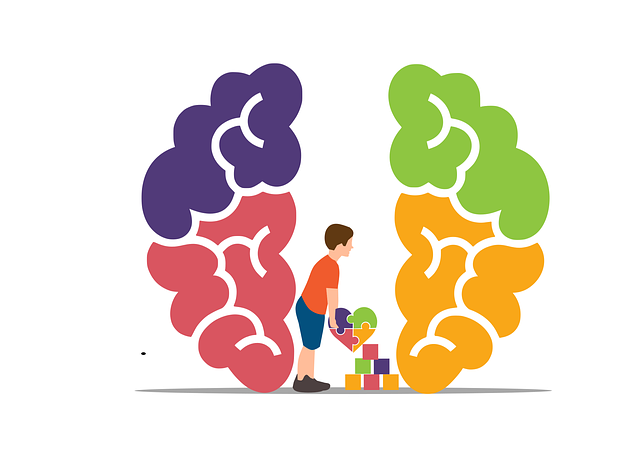Boulder Bariatric Evaluations Therapy offers a comprehensive approach to well-being by integrating physical health interventions with psychological resilience-building through the Resourceful Functioning Model (RFM). This personalized model identifies internal strengths, external support systems, and problem-solving strategies. By combining mindfulness practices and cultural sensitivity, individuals develop effective stress management, emotion regulation, and healthier coping mechanisms. Evaluations go beyond physical metrics, assessing psychological, emotional, and eating habits to craft tailored resilience-building strategies like Mental Wellness Journaling Exercises. This holistic approach not only supports physical transformations but also strengthens individuals' resilience to navigate life's challenges. Success is measured through regular evaluations assessing mental health improvements and coping mechanism enhancements, ensuring personalized guidance for each participant in a supportive environment.
“In today’s fast-paced world, building resilience is key to navigating life’s challenges. This article explores the power of RFM (Resilience Factor Model) and its role in enhancing mental fortitude. We delve into how Boulder Bariatric Evaluations, a unique therapy approach, significantly improves treatment outcomes. Through a comprehensive guide, learn practical steps for implementing resilience exercises. Discover metrics to measure success and strategies for adjustment, ensuring personalized growth. Embrace the transformation that RFM and boulder bariatric evaluations can bring to your well-being.”
- Understanding RFM and Its Role in Resilience Building
- The Impact of Boulder Bariatric Evaluations on Therapy Outcomes
- Implementing Resilience Exercises: A Step-by-Step Guide
- Measuring Success: Tracking Progress and Adjusting Strategies
Understanding RFM and Its Role in Resilience Building

Resilience is a critical component of overall well-being, enabling individuals to navigate life’s challenges with adaptability and bounce back from adversity. This is where RFM (Resourceful Functioning Model) steps in as a powerful framework. Developed through extensive research, RFM identifies key factors that contribute to an individual’s ability to cope and thrive despite hardships. By understanding one’s resources – internal strengths and external support systems – and functional strategies for problem-solving, individuals can build resilience. This tailored approach is particularly relevant for those seeking comprehensive mental healthcare solutions, such as Boulder Bariatric Evaluations Therapy, where addressing underlying psychological resilience can complement physical health interventions.
Integrating practices like Mindfulness Meditation and cultivating cultural sensitivity in mental healthcare practice further enhances RFM’s effectiveness. These evidence-based techniques empower individuals to manage stress, regulate emotions, and develop healthier coping mechanisms, thereby strengthening their resilience muscles. Furthermore, considering cultural nuances ensures that support is tailored to individual needs, promoting effective Anxiety Relief and fostering a sense of belonging within the therapeutic process.
The Impact of Boulder Bariatric Evaluations on Therapy Outcomes

Boulder Bariatric Evaluations play a pivotal role in enhancing therapy outcomes, particularly in mental health treatment plans. These comprehensive assessments go beyond traditional weight measurements by delving into an individual’s psychological and emotional state, eating habits, and overall well-being. This multi-faceted approach is crucial for tailoring effective interventions, as obesity or bariatric surgery often intertwines with complex mental health issues like depression, anxiety, or binge eating disorders.
By integrating Boulder Bariatric Evaluations into therapy practices, mental health professionals can facilitate more precise Risk Management Planning. The insights gained from these evaluations enable practitioners to guide clients towards tailored resilience-building strategies. Mental Wellness Journaling Exercises, for instance, can be designed to address specific challenges identified during the assessment, fostering a deeper understanding of emotional triggers and promoting healthier coping mechanisms. This holistic approach not only supports physical health changes but also empowers individuals to navigate life’s complexities with enhanced resilience.
Implementing Resilience Exercises: A Step-by-Step Guide

Implementing Resilience Exercises involves a structured approach to empower individuals with effective coping strategies. Here’s a step-by-step guide tailored for those seeking transformation, such as those engaging in Boulder Bariatric Evaluations Therapy. Firstly, assess individual needs and goals, incorporating discussions on social skills training to understand unique challenges. This foundation is crucial for designing personalized resilience building exercises that resonate with the participant’s experiences.
Secondly, create a safe and supportive environment conducive to learning and growth. Mental wellness coaching programs can guide this process by fostering open communication and encouraging active participation. Through progressive exercises, individuals learn to navigate stress, anxiety, and emotional turbulences. Incorporate various activities like mindfulness meditation, cognitive reframing techniques, and positive affirmation practices. Regularly review progress, adjust strategies as needed, and celebrate achievements to reinforce a culture of resilience within the community.
Measuring Success: Tracking Progress and Adjusting Strategies

Measuring success is a vital aspect of any resilience-building program, and for RFM (Resilience, Fitness, and Mindfulness) exercises, tracking progress is key to ensuring positive outcomes. Regular evaluation through Boulder Bariatric Evaluations Therapy provides a comprehensive understanding of each participant’s journey. This involves assessing not only physical changes but also mental health awareness and improvements in coping mechanisms. By integrating mindfulness meditation techniques into the RFM program, participants can gain valuable insights into their emotional well-being and stress management skills.
Adjusting strategies is an iterative process that requires continuous monitoring. If the initial exercises prove ineffective or if certain individuals struggle, trauma support services can be tailored to offer personalized guidance. This adaptive approach ensures that every participant receives the necessary tools to enhance their resilience, whether it’s through refined fitness routines, enhanced mindfulness practices, or additional mental health interventions, thereby fostering a supportive environment for holistic development.
The implementation of RFM (Resilience, Flexibility, and Mastery) exercises, as outlined in this article, provides a structured approach to enhancing resilience. By combining insights from Boulder Bariatric Evaluations with a step-by-step guide for therapy integration, professionals can significantly improve treatment outcomes. Measuring success through progress tracking allows for adjustments to strategies, ensuring tailored interventions that empower individuals in their journey towards better mental health and well-being.












